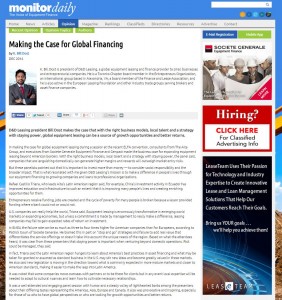D&D Leasing president Bill Dost makes the case that with the right business models, local talent and a strategy with staying power, global equipment leasing can be a source of growth opportunities and better returns.
In making the case for global equipment leasing during a session at the recent ELFA convention, consultants from The Alta Group, and executives from Societe Generale Equipment Finance and Genpact made the business case for expanding equipment leasing beyond American borders. With the right business models, local talent and a strategy with staying power, the panel said, companies that are languishing domestically can generate higher margins and rewards will outweigh market entry risks.
But these panelists pointed out that it is important to invest more than money — to consider social responsibility and the broader impact. That is what resonated with me given D&D Leasing’s mission is to make a difference in people’s lives through our equipment financing to growing companies and loans to professional organizations.
Rafael Castillo Triana, who leads Alta’s Latin American region said, for example, China’s investment activity in Ecuador has improved education and infrastructure to such an extent that it is improving many people’s lives and creating enriching opportunities for them.
Entrepreneurs receive funding, jobs are created and the cycle of poverty for many people is broken because a lessor provided funding where a bank could not or would not.
U.S. companies can really help the world, Triana said. Equipment leasing is enormously transformative in emerging world markets or expanding economies, but unless a commitment is made by management to really make a difference, leasing companies may fail to gain expected rates of return on investment.
In EMEA the failure rate can be as much as three to four times higher for American companies than for Europeans, according to Patrick Gouin of Societe Generale. He blamed this in part on “stop and go” strategies and failure to add real value that differentiates the service offerings or doesn’t take into account the unique needs of the region. Based on what the attendees heard, it was clear from these presenters that staying power is important when venturing beyond domestic operations. Risk could be managed, they said.
In fact, Triana said the Latin American region hungers to learn about America’s best practices in asset financing and what may be taken for granted or assumed as standard business in the U.S. may stir new ideas and become greatly valued in these markets. He also said new legislation is moving in the direction toward what is commonly expected in more mature markets and closer to American standards, making it easier to make the leap into Latin America.
It was noted that some companies move overseas with partners or to be there for clients but in any event local expertise will be needed to adapt to cultural nuances and learn how to cultivate necessary relationships.
It was a well-attended and engaging panel session with humor and a steady volley of lighthearted barbs among the presenters about their differing tastes representing the Americas, Asia, Europe and Canada. It also was provocative and inspiring, especially for those of us who to have global perspectives or who are looking for growth opportunities and better returns.


